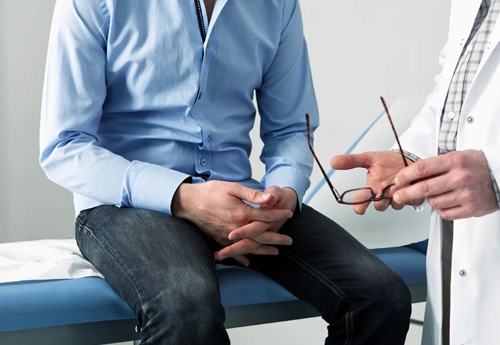Prostate biopsy is done to distinguish whether the existing prostate disease is benign or malignant.

Because benign prostate enlargement and prostate cancer, if any, are different in both medication and surgical techniques. In other words, sometimes a prostate biopsy should be performed before starting the right treatment in a patient with suspected prostate cancer.
Prostate biopsy should be performed in detected patients.
It is generally a safe procedure. Prostate biopsy (removal of prostate piece) is a worrisome procedure for patients. Questions such as 'Is prostate biopsy dangerous', 'Is prostate biopsy painful?', 'Is anesthesia performed in prostate biopsy?' from patients are reflections of their concerns and fears. As physicians, these concerns should be met with understanding.
Prostate biopsy is the removal of small tissues from the prostate with the help of special needles. The parts taken from the prostate are taken for pathological examination and the diagnosis is made.
Unless there is an unusual situation, the accepted number of biopsies is 12. This procedure can be performed both transrectally (through the anus) and perineally (through the skin just above the anus). Both methods have some advantages over each other. It is applied under ultrasound guidance during prostate biopsy.
With the developing medical technology, multiparametric MR-guided MR Fusion prostate biopsy with high sensitivity in the detection of prostate cancer lesion shows high performance in diagnosis accuracy. Thus, it also reduces the possibility of repeated biopsy.
Considering the patient's wishes and concerns, prostate biopsy can be performed under both general, regional and local anesthesia. It can be easily ensured that the patients do not feel any pain during the procedure. Especially in the operating room environment and under general and regional anesthesia, the procedures are very comfortable.
Thanks to the oral painkillers given after the prostate biopsy, there is no significant pain after discharge. Prostate biopsy performed by inexperienced people under local anesthesia may cause discomfort.
As with any procedure, some undesirable effects may occur after prostate biopsy. After the prostate biopsy, blood from the semen is expected to come from the urine at a certain level.
Fever after prostate biopsy is also a possible side effect. This procedure is open to infection, and this rate can be significantly reduced with new generation broad-spectrum antibiotics used before and after the procedure.
Enema before prostate biopsy can also be applied according to the physician's preference. However, it would be beneficial to consult your physician who performed the procedure when fever occurs. Sometimes oral medications are not enough and intravenous or intramuscular antibiotics may be required.
After prostate biopsy, 24 hours should be waited to have sexual intercourse. Prostate biopsy does not disrupt sexual life.
It should not be feared unless there is a significant, continuous red blood coming from the urine. In case of excessive and continuous bleeding, you should contact your doctor immediately. Again, in patients with prostate enlargement, urinary retantion may be observed after prostate biopsy and drainage with a catheter may be required.
Side effects due to prostate biopsy usually pass within 1-2 weeks.
The duration of the pathology results varies according to the hospital conditions. This period can vary from 3-4 days to 1 month. I think that both the patient's anxiety while waiting for the pathology result and the pathology results should be concluded quickly in order to start the treatment as soon as possible.
Although no special nutrition is required after prostate biopsy, it is recommended to consume enough water, be careful not to be constipated, and use antibiotics given after the biopsy.
After the detection of prostate cancer, your doctor will recommend the most appropriate treatment model for you according to the stage of the disease.
May cause burning in urine; It is desirable to avoid hot, spicy, acidic drinks, tea and coffee as much as possible. If it was stopped before the prostate biopsy, be sure to remind your doctor when to start the blood thinners again.
In individuals with prostate disease, it is sometimes necessary to perform a prostate biopsy before the correct diagnosis and therefore the correct treatment for the correct prostate surgery. In some patients, out of necessity, if there is a situation such as "whether it is done or not", the patient and the physician can decide by making the profit-loss calculation together.
Whatsapp: +905324850016
Instagram: @drarifdemirbas
Youtube: @drarifdemirbas
- I will definitely recommend this hospital in the future.
- I cannot recommend Dr. Arif Demirbaş enough.
- God continue to bless you in all your good work.
All TestimonialsMeet Alpha from Sierra Leone who just undergone a PCNL and Utereoscopy surgeries at the Doruk hospital in Bursa. I want to start by sending a massive thank you to Dr Arif for exhibiting such a {...}
24.01.2025I cannot recommend Dr. Arif Demirbaş enough. My father had been living with a catheter for over two years due to benign prostatic hyperplasia, which also caused bladder stones and an inguinal h{...}
24.01.2025Thanks to you Dr Arif for your successful kidney stone surgery on my Son Ryan since after we came back from Turkey to date Alhamdulillah Ryan is very ok Alhamdulillah bravo for your Good work. {...}
24.01.2025